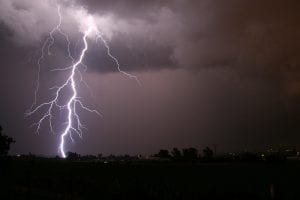We’ve all felt the onset of the heat and with summer well upon us we are certain to be in for more hot and humid days. So with the extreme heat and summer storms already upon us what can we do to protect our home appliances when we need them most.
Two issues we will discuss:
– The heat and added strain on appliances
– Storms and Power outages
The Heat

As the temperature rises your fridge and freezer in particular will be most vulnerable as they work harder to maintain the optimal temperature. We tend to use the fridge more – grabbing that extra cold drink of water, or something stronger after a hard day’s work and as we get that nice burst of cold air as we open the fridge or freezer doors, it’s that loss of temperature that your fridge/freezer needs to work hard to replace.
Some tips for reducing the strain:
– Set the temperature on your fridge to between 3°C and 5°C and between -15°C and -18°C for your freezer. Anything lower will cause the fridge/freezer to work unnecessarily harder and any warmer may cause food spoilage.
– Ensure your fridge is located in a cool area (don’t forget your second fridge if it’s in the garage or somewhere particularly hot) and well ventilated with at least a few inches of clearance all the way around, particularly at the back of the unit as it needs space to allow it to circulate air and disperse heat from your system. Without adequate ventilation your fridge can overheat, leading to an array of issues.
– Cover all your Christmas goodies and other food which will not only prevent your foods drying out but prevent moisture build-up in the fridge.
– Try not to overfill your fridge. Now I know what you’re thinking, it’s Christmas and with all the Christmas cheer and delicious food for the eating it’s hard not to fill the fridge and freezer to the brim. Just keep in mind there is more chance of spoilage and of a nasty tummy ache if your fridge and freezer can’t maintain the adequate temperature, so consider keeping non-perishables out of the fridge (such as drinks) until the day their needed.
– Keep your door seals clean to ensure there is no obstructions in sealing in that nice cool air and check your door seals for leaks if you have an older fridge.
– Keeping your house cool will not only give you more comfort but also allow all of your appliances to work normally without the added strain of the heat.
Storms and Power outages

As I write this article the thunder is thumping in the background and the sky is lighting up with the familiar lighting strikes that we have experienced the last few days. The Australian storms can not only be dangerous, but very unforgiving on appliances. Some tips for keeping both you and your appliances safe:
– Unplug! Getting a surge of power through your home is more common than you would think. A lightning strike over a km away can radiate an electromagnetic field and cause a surge of power through your home, affecting appliances that are plugged in. If your home when a storm rolls in try to disconnect appliances that you’re not relying on (TV, computers, etc) and don’t just switch them off, pull the plug out from the wall. An important note -If you do see the power flicker then it’s even more imperative to pull the plug on your appliances. Commonly referred to a s a ‘Brown out’ your appliances will draw excess power and the risk of burn out is high.
– Use surge protectors, particularly on your big ticket items and the ones you rely on the most – fridge/washing machine, tv, etc. The cost of the surge protectors will be minimal compared to replacement of a large appliance or the food spoilage if your fridge stops working (especially with the fridge full of Christmas goodies!)
– If there is a loss of power place perishables from your fridge into the freezer – this will give them more chance of survival. Also, avoid opening the fridge or freezer after the power outage to maintain as much of the temperature as possible.
Following the above tips can reduce risk to your appliances but needless to say we cannot always avoid every issue. So, if you do experience any problems with your appliance or simply want to discuss your options for maintenance, don’t hesitate to call me.
Ryan – Appliance Repair Guy

